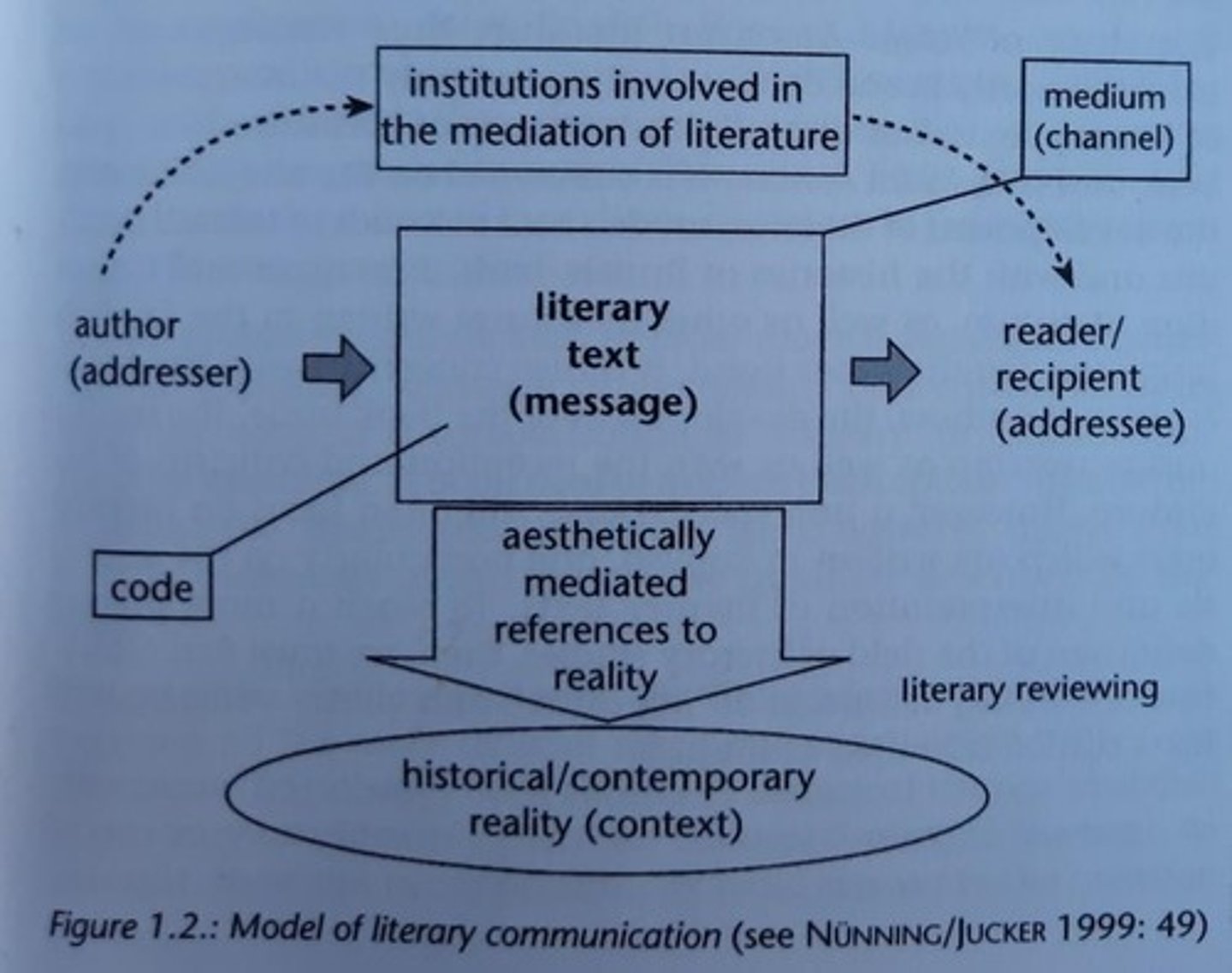1 Introduction to Literary Studies with Franziska Stolz
1/17
There's no tags or description
Looks like no tags are added yet.
Name | Mastery | Learn | Test | Matching | Spaced |
|---|
No study sessions yet.
18 Terms
What are the three disciplines of literary studies?
- Literary theory
- Literary criticism
- Literary history
What does literary theory focus on?
(Greek theorein: to observe) simply means reflection and poses the questions: what is literature, how does it come into existence, and what does it do for which reasons? The answers to these questions usually imply assumptions about individual identity, society and culture, and suggest a particular approach.
What does literary criticism focus on?
Describes, analyses, interprets and evaluates literary works in two basic ways:
1. The reader either records his/her more or less subjective impressions of the text or
2. Presents an approach that explains its questions and terms of analysis in theoretically informed criticism → this is the aim of literary studies
What does literary history focus on?
(re)constructs the development of literature, taking into account theoretical assumptions, criticism and historical context. Literary histories establish and revise a canon of works.
What is a literary canon?
A list of important texts deemed suitable for academic study, often established by critics or anthologists.
What issues are associated with the concept of a literary canon?
It can be elitist, classist, misrepresentative of various groups, and may exclude certain texts.
What perspective did Aristotle (384-322 BCE) have on literature?
mimesis, the imitation of reality
What was Horace's (65-8 BCE) view on literature?
pleasure and/or profit (Latin: aut delectare aut prodesse); literature provides an aesthetic experience but can appeal also to the reader's moral and political judgement
How did William Wordsworth (1770-1850) define literature?
As the author's subjective expression of his/her emotions and imagination
What was Edgar Allan Poe's (1809-1849) stance on literature?
He advocated for 'art for art's sake,' viewing literature as a purely aesthetic object.
What does Oscar Wilde (1854-1900) suggest about perception in literature?
"Things are because we see them, and what we see, and how we see it, depends on the Arts that have influenced us."
What does the literary system encompass?
The Literary system can be described schematically as a network of relations consisting not only of literary texts, but also of the people that produce, mediate, read and process these texts, including authors, publishers, readers and critics.

What is the nature of literary communication?
It is asymmetric, often non-pragmatic, and offers ambiguous aesthetic information open to various interpretations.
What question does Eagleton raise about defining literature?
He identifies problems in arriving at an accurate definition of 'literature'.
3 major types of literary texts
1 Lyric texts (Short, intensely personal poems expressing emotion or thought.)
2 Narrative texts (Any text that tells a story through characters, plot, and setting)
3 Dramatic Texts
Types of lyric texts
Sonnet – 14-line structured poem, often about love or time
Ode – Formal, elevated poem that praises a person, idea, or object
Elegy – Mournful reflection on loss, death, or grief
Hymn – Religious or spiritual poem of praise
Ballad – Narrative poem with strong rhythm, often tragic or romantic
Haiku – Short Japanese poem (5-7-5 syllables), focused on nature or fleeting moments
Lied (Song) – Emotional, melodic poem, often about love or longing
Epigram – Brief, witty poem with a clever twist
Free Verse – Poem without fixed meter or rhyme, emphasizing natural rhythm and voice
Types of narrative texts
Epic (long, elevated poem—e.g. Homer’s Iliad)
Novella (shorter than a novel but still prose narrative)
Short story (very brief prose narrative)
Fairy-tale (folk or literary tale with magical elements)
Fable (brief tale, often with animals, that teaches a moral)
Novel (extended prose narrative)
Crime novel (focus on a crime/investigation)
Historical novel (set in a past era, blending fact and fiction)
Bildungsroman (coming-of-age story)
Types of dramatic texts
Tragedy (serious drama ending in catastrophe)
Comedy (lighter drama ending happily)